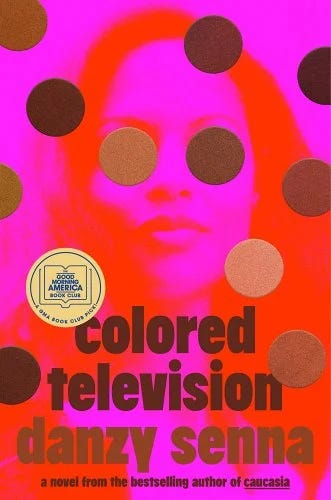Review: Colored Television by Danzy Senna
A respite from the intensity of reading race
I have not read a lot of Danzy Senna, but she is a masterful writer whose name I’ve heard a lot over the years and I think I’ve read some of her nonfiction. Colored Television is seriously funny, with sharp dialogue and amazing characterization. I was a little worried because it’s been getting rave reviews and I tend not to agree with raves. In this case, the satire and the wit is a fun ride from beginning to end.
The satirist whose work has probably spoken to me most is Paul Beatty, because you could tell in books like The Sellout that he truly was mostly writing for his own amusement. There’s a freedom in that kind of writing, the writing that is entertaining for the reader because it’s entertaining for the writer. In Colored Television, Danzy Senna is having a great time, and the result is a fast-moving current of a book that grabs your attention in the opening pages and keeps getting better the further you get into it.
I’m partial to the main character, Jane, who has written a shitty, very long opus that is to be the representative novel about mulatto history. Nobody likes it, and I promise you, as someone who has written 10+ drafts of a long ass book that your agent, publisher and friends who are not afraid of you are not sure how to break the news to you about, Jane’s mostly reasonable reactions to this are very, very relatable.
After all, Jane’s on sabbatical from her teaching job where she needs to publish said opus to get tenure. Her artist husband, Lenny, is sort of sick of her shit. And they have two (kind of bratty, if I may?) kids.
We meet them as the novel opens as they are house-sitting for Jane’s friend, Brett, who is also a writer. Brett is successful, so he’s got a beautiful, strangely designed house in a fancy part of Los Angeles (Don’t ask me about West Coast details, my brain is Bronx, they do not compute or even saturate) and he has connections to the television world that Jane ends up trying to exploit to an almost ruinous end.
What writers do, especially those of us who have the sacred task of writing from the margins, from telling the stories our ancestors could not — whether that is Black writing or biracial writing with a little Black in it — is sometimes described as a bit mythical or mystic because we are inventing even as we infuse some of our real life into the work.
What entertained me so about Colored Television is that I was not really asking myself the whole time about how close to Danzy Senna’s experience the book was. I was thinking about how cleverly she mocks both the publishing and entertainment industries for insisting on viewing identity as a some trend to capitalize on instead of an integral part of being American. I was thrilled by reading a writer who gets it and refuses in Colored Television to take it seriously or give it gravitas or air.
Best of all, a smart person — possibly Toni Morrison? — wrote that somehow the creative output of Black people and writers of color are implicitly assigned the label of being political, even if they are not. What a relief to understand that Colored Television is decidedly not about politics, but about the humanity of a biracial novelist who is failing and does not care that she’s failed, because she will keep trying, no matter what it takes, to tell the stories of her people. The reason it’s not political is because, duh, everyone is her people. Joke’s on you if you disagree. Brilliant.



As one who feels the need for "a respite ...", your words caught my attention. Your emotional connection/reaction to the characters got me interested in the book and your last paragraph made me buy it. Thank you for the great review.
I really love the way you write about books because it helps me understand if I want to buy/read.